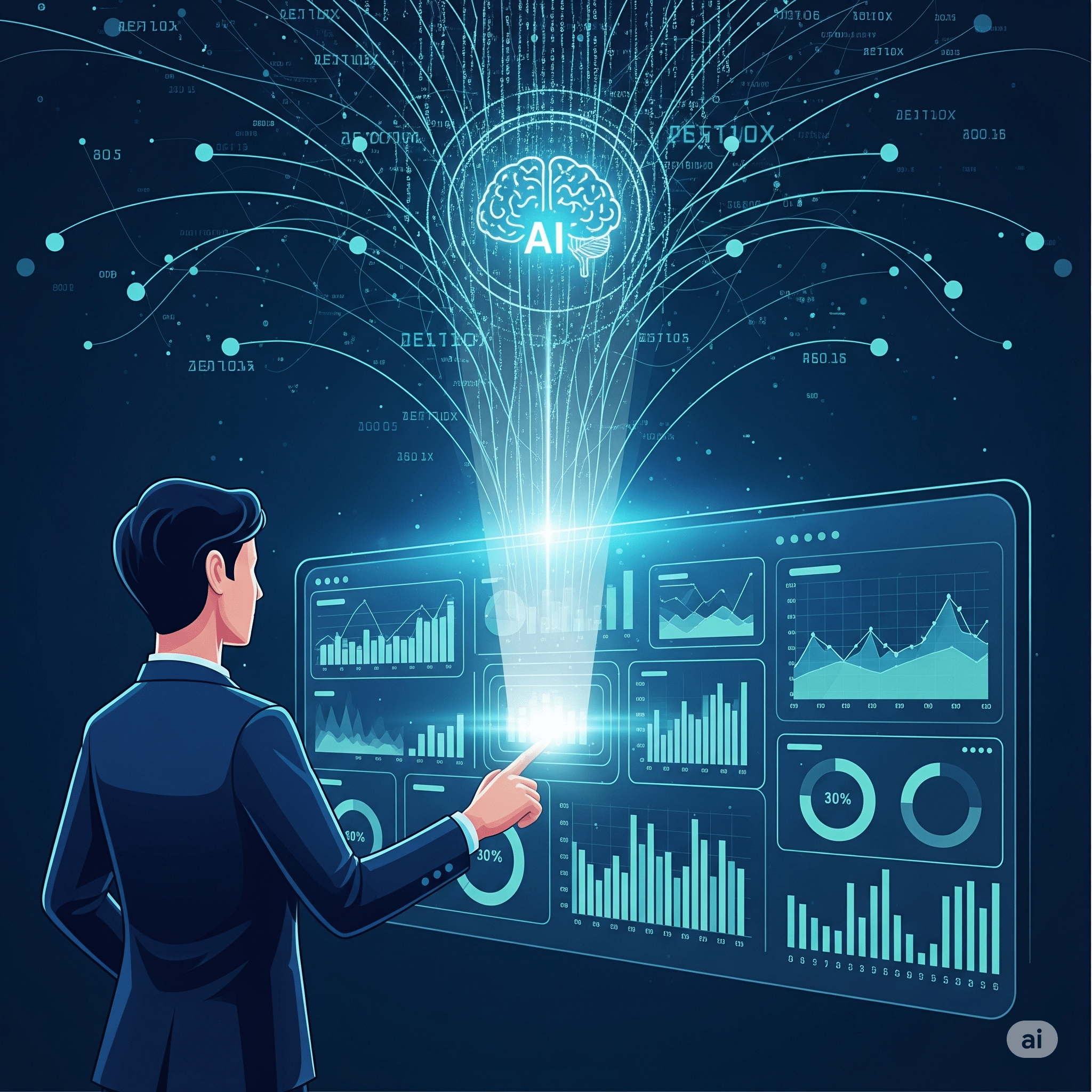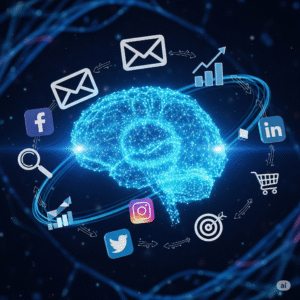For any marketer, data is everything. It tells you what’s working, what’s not, and where your next opportunity lies. But the sheer volume of data today is overwhelming, making it impossible to analyze manually. You’re left sifting through mountains of spreadsheets, trying to find a signal in the noise. This is where artificial intelligence (AI) has gone from a useful tool to an essential partner. An effective AI marketing insights strategy is the key to unlocking a competitive edge. This comprehensive guide will show you how to leverage AI to move beyond basic analytics, uncover hidden trends, and make smarter, faster decisions for your business.
The Problem with Traditional Analytics and the Rise of AI for Strategic Decision Making (AI marketing insights)
For a long time, marketing analytics was a reactive process. We would launch a campaign, collect data, and then spend weeks analyzing what happened. This approach was slow, often inaccurate, and provided a rearview mirror view of our efforts. This is where AI for strategic decision making is changing the game. AI can analyze millions of data points in real-time, identifying patterns and correlations that a human analyst might miss. It can look at everything from customer behavior and social media sentiment to weather patterns and economic data to give you a holistic, predictive view of your market.
This is a powerful evolution for several reasons. First, it enables unprecedented speed. You can identify an emerging trend and act on it in minutes, not months. Second, it allows for a more granular understanding of your audience. AI can analyze vast amounts of customer data to create highly specific segments, helping you to personalize your messaging at a new level. Ultimately, mastering AI marketing insights is not just about automation; it’s about augmentation, and it is a fundamental requirement for success in today’s fast-paced digital landscape.
Real-World Wins: How Marketing Analytics AI is Driving Results (AI marketing insights)
The adoption of AI in marketing is already delivering measurable results. These real-world examples highlight how companies are leveraging marketing analytics AI to work smarter, not harder.
Case Study 1: L’Oréal and Virtual Try-Ons
L’Oréal, a global beauty brand, faced a challenge common in their industry: helping customers find the right products without going into a store. To solve this, they implemented an AI-powered tool called ModiFace that allowed for virtual try-ons. The AI analyzed a customer’s facial features and skin tone to provide personalized product recommendations. The results were staggering. The tool has been used for over 1 billion virtual try-ons and has resulted in a 3x higher conversion rate for customers who use it. This case study perfectly illustrates the power of AI marketing insights to create a highly personalized customer experience that drives revenue.
Case Study 2: Coca-Cola and Voice AI (AI marketing insights)
Coca-Cola, a brand synonymous with cultural relevance, wanted a new way to engage with its audience. The company implemented a Voice AI that allowed consumers to request personalized digital Coke bottles using voice commands. The AI created a shareable brand experience, strengthening Coca-Cola’s innovative image. This campaign showed how a playful, interactive AI experience can lead to significant brand engagement and buzz. It’s an ideal example of how AI for trend analysis can help a company stay ahead of the curve and connect with its audience in a new way.
Case Study 3: Starbucks’ Predictive Ordering & Personalization
Starbucks wanted to deepen its relationship with its customers. The company’s AI engine, “Deep Brew,” analyzes a customer’s past orders, location, the time of day, and even local weather to suggest a likely order in the app. This is not just a simple recommendation engine; it’s a predictive tool that uses AI marketing insights to anticipate customer needs. The result was a significant boost in order frequency and customer spend, transforming the app into an indispensable daily habit. This case is a fantastic example of a strategic use of marketing analytics AI to increase both revenue and customer loyalty.
A Blueprint for Your AI for Strategic Decision Making Workflow
Embracing AI in your marketing strategy can feel intimidating, but you can build a successful workflow with a few simple steps. The key is to start small, with a focus on how AI can be an assistant, not a replacement.
Your Step-by-Step Guide to Smarter Marketing (AI marketing insights)
- Define Your Objectives: The first step is to be clear about your business goals. What problems are you trying to solve? Are you looking to increase customer engagement, predict purchasing behavior, or identify an emerging trend? Having a clear purpose will give you the right framework for your AI prompts and tool selection.
- Unify Your Data: AI thrives on data. You need to ensure your data is clean, structured, and accessible. Use a data integration tool to pull data from all of your sources, like social media, your website, and your CRM, into a single, unified dashboard. This is a crucial step in any AI marketing insights strategy.
- Leverage AI for Trend Analysis: Use your chosen
AI for trend analysistools to process the data and generate insights. Ask the AI to identify emerging trends, analyze your competitors’ campaigns, and provide you with a comprehensive report. - Act on the Insights: The final and most important step is to take action. Use the insights from your
marketing analytics AIto inform your product roadmap, adjust your marketing campaigns, and create a more personalized customer experience.
Top Tools for AI for Strategic Decision Making
The market is rapidly filling with powerful tools designed to help marketers. Here are some of the most effective platforms to get you started.
- Google Cloud AI: Google offers a suite of AI services that can be a powerful hub for your marketing analytics. Its tools can help you build predictive models, analyze customer data, and uncover emerging trends at scale.
- HubSpot: While primarily a marketing and sales platform, HubSpot’s CRM includes AI-powered tools that help you with everything from lead scoring to content recommendations, making it a powerful tool for
AI for strategic decision making. - Sprout Social: This social media management tool has integrated AI-powered features that can help you analyze social media data, identify trends, and uncover actionable insights from your social media efforts.
- Brandwatch: This platform is a leader in social listening and sentiment analysis. It uses AI to track brand mentions, analyze customer sentiment, and identify emerging trends from social media conversations.
The Future of Marketing is Strategic and Insightful
The potential of AI marketing insights is immense. The ability to move from a reactive to a proactive marketing strategy allows you to focus on the strategic, creative, and human parts of your job. As a recent McKinsey report on the future of work highlights, the most successful companies are those that are fundamentally redesigning their workflows to support human-AI collaboration. This shows that the market is embracing these tools, and as they get more powerful, the value they provide will only grow.
Ultimately, the goal of a great AI for strategic decision making strategy is not to automate your entire marketing department. It’s about using AI as a tool to build a more sustainable, profitable, and enjoyable business. It’s about freeing up time so you can focus on building relationships, solving complex problems, and fostering creativity. That is the true power of a human-centric approach to AI.
AI Content Calendar Guide: Build a Year of Content in 30 Minutes
Keyword List: AI marketing insights, AI for strategic decision making, marketing analytics AI, AI for trend analysis, AI in marketing, marketing strategy, data analysis, business growth, AI tools, productivity, AI for business, digital marketing, AI analytics, trend forecasting, marketing automation
AI Job Market Predictions: Is Gen Z Right to Fear Permanent Unemployment?



